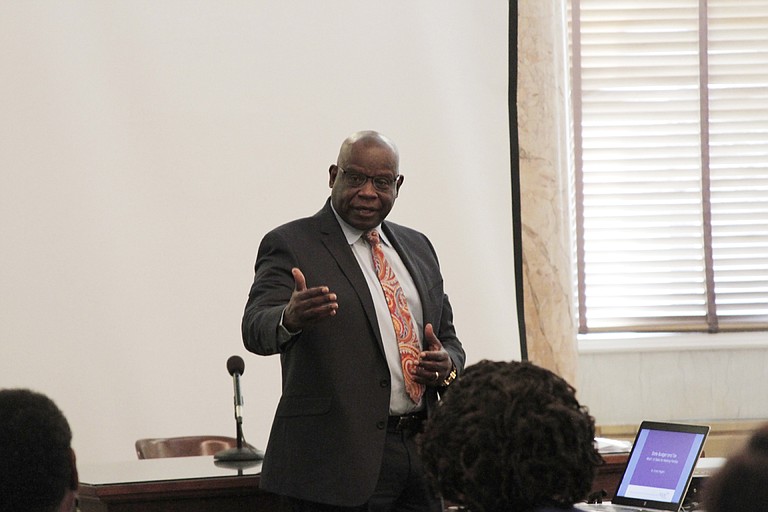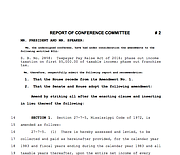Dr. William Truly told members of several state Baptist conventions and the Legislative Black Caucus that the state should expand Medicaid to bring more jobs to the state. Photo by Arielle Dreher.
Wednesday, November 23, 2016
JACKSON — If the Mississippi state budget is a "moral document" or at least one that reveals priorities, the fiscal-year 2018 budget likely faces dramatic tampering in the upcoming legislative session.
Gov. Phil Bryant released his executive budget recommendation on Nov. 15 detailing where his office's priorities lie: mainly with education and child-protection services. A deeper look into the governor's priorities show that cuts at various levels could be necessary in the coming years, due to modest economic growth.
Bryant cut the current fiscal-year's budget by $56.8 million back in September due to the Legislature's "staff error." This cut meant a 1.6-percent reduction across most state agencies, except the Mississippi Adequate Education Program, which funds the state's public schools.
In Bryant's fiscal-year 2018 budget recommendation, he warns that "our path forward will not be easy," blaming the federal administration in Washington, D.C., for stifling economic growth nationally. Mississippi has experienced slight economic growth in recent years, but at a slower pace than most states. The state's general-fund collections "have slipped below estimates for most months in 2016," Bryant's budget recommendation says.
Problem of Tax Cuts
At a Nov. 17 public hearing, Corey Wiggins, the director of the Hope Policy Institute, called the state's budget problems both a shortfall and a crisis. Wiggins said Mississippi is not alone in its slow growth.
"What we're learning talking to other colleagues...is that Mississippi is not alone; we're seeing this across other states in the U.S. as well," Wiggins said.
His reasoning behind such slow growth is not the federal government like Bryant, however. Wiggins pointed to a series of tax cuts that the Mississippi Legislature implemented from 2012 to 2015. Wiggins said that a rough estimate for the total value of those tax cuts is around $350 million, but is likely higher.
"There have been a number of cuts where we don't know what the total financial impact is to the state budget, so this is based on the data we've been able to look at and get numbers for," he told community stakeholders and members of the Legislative Black Caucus last week.
In the 2016 legislative session, lawmakers passed the Taxpayer Pay Raise Act, a series of tax cuts set to begin in 2018 that will equal close to $415 million in less revenue in the state's coffers in a decade and then continue to cost the state money thereafter. Wiggins described the state's budget crisis paired with its tax cuts as a family sitting down to budget out how to pay bills.
"The way I describe this (is) when you sit down, and you're getting ready to write out your bills, and you're looking at the amount of money that's coming in from your paychecks. You see that you don't quite have enough to pay your bills and at the same time you're sitting down, you look at your family member or spouse and say, 'You know something? I think I'm going to quit working," Wiggins said at the Capitol last week.
Bryant's budget recommendation notes that from 2012 through 2016, Mississippi increased government spending by $1.1 billion.
"That kind of growth in spending over such a short period is simply unsustainable and must be addressed," Bryant's budget recommendation says. "The Legislature took a first step to address this issue in the 2016 legislative session, when it appropriated less total money for FY2017 than it did in FY2016."
In an effort to streamline and decrease government spending, House Speaker Philip Gunn and Lt. Gov. Tate Reeves, both Republicans, have hosted agency budget working groups throughout the summer and into the fall to find ways to save in government spending.
Health Care Jobs?
So far in 2016, the Mississippi Development Authority has announced projects, like the Continental Tire Plant and the Raytheon Air Training Systems, that should bring 5,500 new jobs to the state.
Advocates of expanding Medicaid continue to point out that it would bring the state an estimate of 9,000 new jobs, while making health care more accessible for those in rural parts of the state.
Dr. William Truly, a local doctor, told the Legislative Black Caucus last week that the state should expand Medicaid—if nothing else, for the potential capital involved.
Additionally, hospitals lose revenue to uncompensated care, when patients use the emergency room like a doctor's office and don't have to pay for the services due to Medicare or Medicaid. Truly argues that expanding Medicaid would help bring the high costs of uncompensated care down as well as cover the 20 percent of Mississippians under the age of 65 who don't have health care.
"It creates more jobs than Nissan ... more jobs than the Kemper plant, it creates 9,000 jobs," Truly said at the Capitol last week.
Polls conducted in 2016 by Mason Dixon polling, paid for by the Mississippi Health Advocacy Program, show that the majority, 63 percent, of Mississippians favor expanding Medicaid, including 46 percent of those surveyed who identify as Republicans.
"So I say to the Mississippi Legislature, not to expand Medicaid is now going against the grain of the wishes of the people," Truly said.
What happens with Medicaid distribution could change in the wake of President-elect Donald Trump's policy proposals, but Congress would have to approve many of those changes before states could implement them.
Email state reporter Arielle Dreher at [email protected].



Comments
Use the comment form below to begin a discussion about this content.
Sign in to comment
Or login with:
OpenID